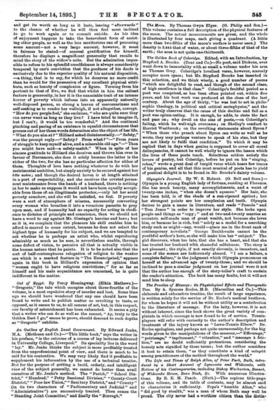The Golden Book of Coleridge. Edited, with an Introduction, by
Stopford A. Brooke. (Dent and Co.)—No poet, said Dickens, ever went down to immortality with so small a volume under his arm as Thomas Gray, Coleridge's loveliest verse, however, scarcely occupies more space; but Mr. Stopford Brooke has inserted in this selection, and we think wisely, a good number of poems "which are delightful to read, and though of the second class, of high excellence in that class." Coleridge's fruitful period as a poet was comprised, as has been often pointed out, within five years, and his best work was produced at the close of the last century. About the age of thirty, "he was lost to art in philo-r sophic theology, in political and critical metaphysics," and the writer truly observes that the cause of this decline and fall as a poet was opium-eating. It is enough, he adds, to state the fact and pass on ; why dwell on the sins of poets,—on Coleridge's failing, which he well-nigh overcame ; on Shelley's conduct to Harriet Westbrook ; on the revolting statements about Byron ? " When those who preach about Byron can write as well as he wrote, they may perhaps venture to speak of his sins, but they are not likely to fulfil that condition." To which it may be replied that in days when genius is supposed to cover all moral delinquencies, it cannot be well wholly to ignore the lesson which the lives of these poets teach. Selections seldom satisfy the lovers of poetry, but Coleridge, before he put on his " singing. robes," wrote a great deal of turgid verse which bears few traces of his genius, and all that this most musical of poets has to yield of poetical delight is to be found in Mr. Brooke's dainty volume.


































 Previous page
Previous page